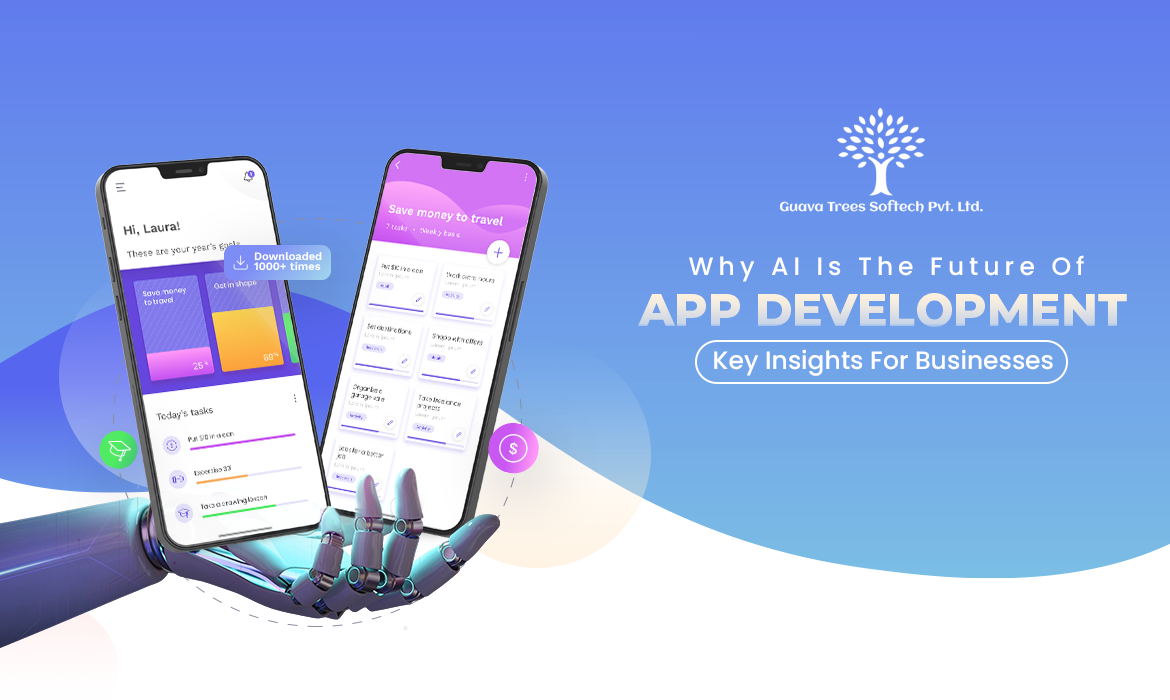In today’s hyper-connected digital landscape, businesses are under increasing pressure to deliver personalized, intelligent, and seamless experiences through their applications. Traditional development models, while still relevant, are no longer sufficient to meet the dynamic needs of users. This is where Artificial Intelligence (AI) is rapidly transforming the game.
At Guava Trees Softech Pvt. Ltd, we believe AI is not just an emerging trend—it’s the future of app development. From automating coding processes to powering intelligent features like recommendation engines and predictive analytics, AI is revolutionizing how applications are conceived, built, and optimized. In this blog, we explore the core reasons why AI is reshaping app development, along with key insights for forward-thinking businesses.
- Smarter User Experiences with AI
Modern users expect intuitive, responsive, and context-aware applications. AI enables developers to deliver just that. Through machine learning (ML) algorithms and natural language processing (NLP), apps can now:
- Understand user behaviour and preferences
- Offer personalized content and recommendations
- Respond to voice commands or typed queries intelligently
- Predict user needs based on historical interactions
For example, apps like Netflix, Spotify, or Amazon use AI-driven recommendation engines to enhance user retention and engagement. These aren’t just features—they’re business-critical differentiators.
Business Insight: Integrating AI into your apps can boost customer satisfaction, improve retention, and drive revenue by anticipating what users want—before they even ask for it.
- Faster Development with AI-Assisted Coding
AI-powered tools are significantly accelerating the app development lifecycle. Technologies like GitHub Copilot, Tabnine, and CodeWhisperer assist developers by:
- Autocompleting code in real-time
- Suggesting optimized algorithms
- Identifying bugs and vulnerabilities during coding
- Automating repetitive boilerplate code generation
These tools not only improve developer productivity but also reduce human error, leading to faster time-to-market.
Business Insight: Organizations adopting AI-assisted development tools can reduce project timelines, cut costs, and reallocate resources to more strategic initiatives.
- Enhanced App Testing and Debugging
One of the most resource-intensive phases of app development is testing. AI is now playing a pivotal role in automating test case generation, identifying edge cases, and predicting potential failures.
AI in testing can:
- Perform regression testing across platforms
- Identify UI/UX anomalies through visual testing
- Analyse logs and flag anomalies in real-time
- Prioritize bugs based on severity and likelihood of occurrence
By reducing manual testing efforts, businesses can launch more reliable apps with fewer bugs and reduced QA costs.
Business Insight: AI-driven QA processes lead to higher product quality, fewer post-release issues, and better user reviews—directly impacting brand trust.
- Intelligent Automation in Backend and Operations
AI doesn’t just enhance the front end; it’s transforming the backend too. AI-enabled DevOps (often referred to as AIOps) can automate infrastructure management, performance monitoring, and even incident response.
Use cases include:
- Predictive scaling based on usage patterns
- Automated rollback during deployment failures
- Self-healing servers and databases
- Real-time alert suppression and root-cause analysis
This reduces downtime, enhances application availability, and lowers operational costs.
Business Insight: AIOps enhances reliability and resilience—critical factors in user satisfaction and SLA adherence.
- Natural Language Interfaces and Chatbots
Voice assistants, chatbots, and conversational UIs are no longer optional. AI-powered interfaces are becoming the norm in modern apps, especially in industries like retail, banking, healthcare, and customer support.
Through NLP and sentiment analysis, AI-driven bots can:
- Understand and respond in natural human language
- Learn from past interactions and improve over time
- Escalate queries intelligently when needed
Not only do these features improve customer experience, but they also reduce dependency on human support teams.
Business Insight: Integrating AI-based conversational interfaces reduces support costs while improving 24/7 user engagement and service quality.
- Predictive Analytics for Better Business Decisions
AI enables applications to collect, process, and interpret vast amounts of data in real time. With predictive analytics integrated into apps, businesses can:
- Anticipate user churn and implement retention strategies
- Optimize marketing efforts by forecasting campaign effectiveness
- Detect fraud patterns or security threats proactively
- Forecast demand and manage inventory more effectively
This turns your app from a static tool into a proactive business enabler.
Business Insight: Apps embedded with predictive capabilities unlock strategic insights, helping businesses make data-driven decisions faster and more accurately.
- Democratization of Development with Low-Code AI Tools
AI is powering a new wave of low-code and no-code platforms, enabling even non-technical users to build robust applications. These platforms use AI to suggest templates, automate logic creation, and connect APIs—dramatically lowering the barrier to entry.
Platforms like:
- Microsoft Power Apps
- Mendix
- OutSystems
…are using AI to empower business teams to build prototypes or production-ready apps without relying solely on development teams.
Business Insight: This democratization accelerates innovation and allows organizations to iterate faster—crucial in competitive markets.
Challenges and Considerations
Despite its promise, AI integration comes with its own set of challenges:
- Data Privacy:AI models rely heavily on data, making compliance with GDPR and other privacy laws a must.
- Bias and Fairness:Poorly trained models can introduce unintended biases, especially in decision-making applications.
- Resource Requirements:AI development and deployment may require significant computational resources.
- Skills Gap:Many teams still lack AI/ML expertise, making partnerships with experienced firms essential.
At Guava Trees Softech Pvt. Ltd, we help clients overcome these hurdles by offering AI consulting, custom model development, and ethical AI implementation.
Final Thoughts: The Future Is AI-Driven
AI is no longer a buzzword—it’s a foundational technology shaping the next generation of applications. Whether you’re a startup building your MVP or an enterprise modernizing legacy platforms, incorporating AI is not a “nice to have”—it’s a necessity.
At Guava Trees Softech Pvt. Ltd, we specialize in infusing intelligent capabilities into applications—across industries and use cases. From strategy and design to deployment and optimization, we bring deep technical expertise and a future-focused mindset to every project.
Looking to build AI-powered apps that stand out in a crowded market?
Let’s talk.







